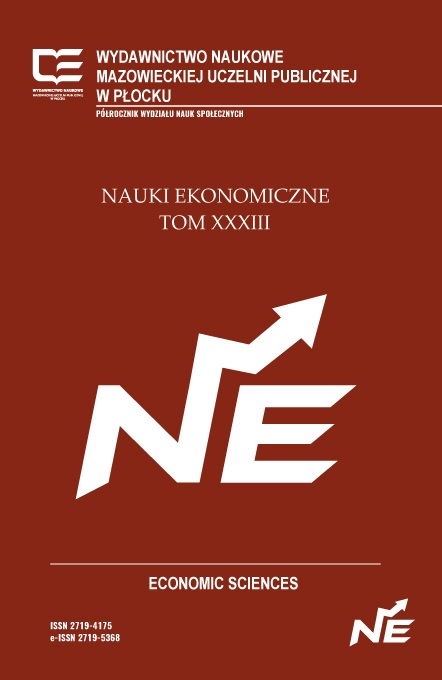ROLE OF INDEPENDENT SCIENCE FOR INNOVATION
DOI:
https://doi.org/10.19251/ne/2021.33(3)Keywords:
Independent Science, Innovation, Change and DevelopmentAbstract
This study opens the horizon of role of independent science in business innovation and profit. The main focus is to diagnose spectrum of independent science in its applications. By the scientific review, role of independent science generates the database of truth in figures, sense of relationship of a variable without the fund and association with the institutions. The contribution of independent scientist functions in every part of planet. Independent science serves at all level of opportunities, innovation and profit. Some of the organization enjoys the fund for research but independent science does not take care of fund. Independent science encourages freedom of research, prediction, expression of truth. Independent science creatively solves the problem scientifically. Independent science reveals influence of body of knowledge, which is beneficial for the state-of-the-art development for the possession of yields. The consequences of independent research acumens into expertise benefactions play a role in economic growth with engagement and origination. In addition, artificial intelligence, machine learning, data science and automation have been altering the agility of resources accessible. Scientific innovation creates the gear force of business. Therefore, the role of autonomous science keeps first trundle innovation altitude and second wheel as cost of risk undertaken by tycoons. The self-regulating scientist contributes his or her edification, insight knowledge to alleviate insufficiency, joblessness and income disparity of diverse cohort at different timeframe. Sustainable development depends upon dynamics of independent research innovative outcomes. Independent science can implore a kind of system to catch fact via scientific route. Thus, the significance of independent science represents the asset of scientific motion self-sufficiently for the advancement to the public scientifically.
References
Amara, N. & Landry, R. (2005). Sources of information as determinants of novelty of innovation in manufacturing firms: evidence from the 1999 statistics Canada innovation survey. Technovation 2005; 25:245–259.
Ankrah, S., & Al-Tabbaa, O. (2015). Universities–industry collaboration: A systematic review. Scandinavian Journal of Management, 31, 387-408.
Barták, J. (2006). Skrytébohatstvífirmy. Praha: Alfa.
Bartes, F. (2009). Paradigmainovací a hodnotovéinženýrství. Brno: VÚT
Bloch, H. and Bhattacharya, M. (2004).Determinants of Innovation. Small Business Economics 22: 155–162.
Coase, R. H. (1974). “The Market for Goods and the Market for Ideas,” 64 The American Economic Review 384–391.
Collison, Ch. (2005). Knowledge management. Brno: Computer Press.
Crepon, B., Duguet, E. and Mairesse, J. (1998) ‘Research and development, innovation and productivity: an econometric analysis at the firm level’. Economics of Innovation and New Technology 7 (2), 115-158.
Clarke J, Newman J (2017). ‘People in this country have had enough of experts’: brexit and the paradoxes of populism. Critical Policy Studies 11:101–116. https://doi.org/10.1080/19460 171.2017.1282376.
Fagerberg, J. (2017). Mission (im)possible? The role of innovation (and innovation policy) in supporting structural change & sustainability transitions. TIK Working Papers on Innovation Studies, TIK Centre, University of Oslo.
Guerrero, M. et al. (2016). Entrepreneurial universities: Emerging models in the new social and economic landscape. Small Business Economics 47(3): 551-563.
Hamel, G. & Green, B. (2007).The Future of Management. Boston: Harvard Business School Press.
J. C. Segen (1992). Dictionary of Modern Medicine.p. 246.ISBN 1-85070-321-3.
Lange, O. (1943) “A Note on Innovations”. The Review of Economic Statistics, 25:1.pp 19-25.
Liebert, H. (2011). Alexander the Great and the History of Globalization.The Review of Politics 73 p533–560.© University of Notre Dame.
Malerba, E., Orsenigo, L., (1997). “Technological Regimes and Sectorial Patterns of Innovative Activities”, Industrial and Corporate Change 6, 83-117.
Mazzucato, M. (2017). Mission-Oriented Innovation Policy - Challenges and opportunities, UCL Institute for Innovation and Public Purpose.
Nolan, A., &Guellec, D. (2019).The digitalisation of science, technology and innovation.An overview of key developments and policies.OECD, DSTI/ STP 14.
Pianta, M. (2000).The Employnemt Impact of Product and Process Innovation, în M. Vivarellyşi M. Pianta (eds.), The Employment Impact of Innovation: Evidence and Policy, Routledge, London.
Romero, I. (2009). PYMES y cadenzas de valor globales.Implicacioness para la politica industrial en las economiasandesarrollo. AnálissisEconómico, 24(57), 199-216.
Sandal, J-U. (2011). Introduksjontil Joseph A. Schumpeter: Entreprenørprofitt – et insitament til demokratisk utvikling (Introduction to Joseph Alois Schumpeter: Entrepreneurial Profit - An Incentive for Democratic development). Ekonomiska Samfundets Tidskrift (The Journal of the Economic Society of Finland), 1.Retrieved from http://www.ekonomiskasamfundettidskrift.fi/est/?p=60.
Sandal, J-U. (2017). Innovation in Education - Dynamic Innovative Learning Methods as Approach to Independent Science. Ukraine - EU. Modern Technology, Business and Law. Modern Priorities of Economics. Societal Challenges. Chernihiv: Chernihiv National University of Technology. Retrieved from http://www.stu.cn.ua/ media/files/conference/Part_1.pdf.
Sandal, J-U. (2017). How innovation maintains and develops democracy. Economic Annals-XXI Journal 165(5-6), 23-26.
Schumpeter, J.A. (1934). The Theory of Economic Development: An Inquiry into Profits, Capital, Credit, Interest and the Business Cycle. London: Oxford Univ. Press.
Senge, P. (2007). Pátádisciplína – Teorie a praxeučící se organizace. Praha: Management Press.
Singh, V. A. (2005). A Revolution in Physics: Einstein’s Papers of 1905 Made Simple. Retrived from https://www.tifr.res.in/~outreach/outreach/einstein.pdfp-39.Science Popularization and Public Outreach Committee Tata Institute of Fundamental Research India.
Cho, H.; Park, J.Y.; Sung, C.S. (2020). How Does Technology Startups Increase Innovative Performance? The Study of Technology Startups on Innovation Focusing on Employment Change in Korea. Sustainability 12, 551: 1-14. Retrived from file:///C:/Users/Administrator/Downloads/sustainability-12-00551.pdf.Assessed on 4 September 2020.
